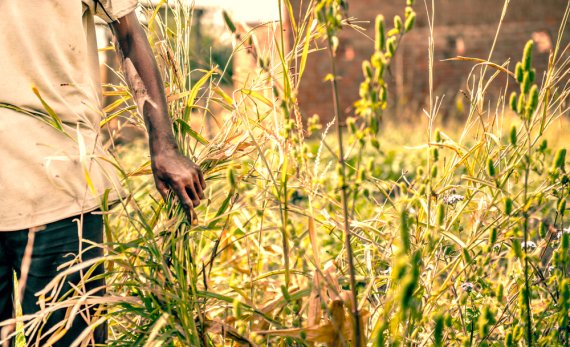<photo: Shutterstock>
Africa’s grain production is currently not self-sustaining. Eight of the ten kilos of rice, wheat, maize, barley and sorghum consumed by Africans come from their own continent; the rest is imported. In the next few decades, the African population will grow quickly; the UN expects that, by 2050, it will be two- and-a-half times bigger than in 2010. Consequently, the demand for grain sorts, the most important crops for the food security of the African population, will increase by more than a factor of three. The researchers investigated the possibility of meeting this increased demand by producing more agricultural products on the present agricultural acreage in ten countries. ‘That is hardly sufficient,’ they concluded this week in PNAS.
Yield gap
Van Ittersum, a professor at Plant Production Systems, and his co-researchers studied how much grain is currently grown per hectare and how much the potential grain production could be if African farmers improved soil fertility, gave the plants enough fertiliser and effectively protected the plants from weeds, diseases and pests. The difference between the actual and the potential yield – the yield gap – is the space to product more food.
The current yields of maize in Africa are about 20 percent of the potential yields for rain-dependent agriculture. To raise this to 50 percent of the potential yield in 2050, the annual increase in productivity for maize in Africa – now not even 1 percent – must more than double, the researchers state. That is difficult enough. And, to become self-sufficient, agricultural acreage must increase by 80 percent. This is not desirable, nor is it possible in many countries.
Irrigation
The researchers argue that African countries have a greater chance of developing a self-sufficient agriculture if they also invest in a plan that includes several crops a year and irrigation. If all these forms of intensification fail, the acreage expansion will be enormous or the African population will become even more dependent on grain imports than it already is.
Large-scale food import in Africa is presently unrealistic, say the researchers. Self-sufficient agriculture is enormously important for Africa because many African countries lack the money to import food. Africa can rely on food imports only if there is enough economic development in sub-Sahara Africa. But, they add, such economic development is the result of strong agricultural development. It is crucial to intensify agricultural production so that the yields per hectare increase without further damaging nature and the environment.
Ten countries
The study estimated the expected population growth, food demand and potential production in ten African countries: Burkina Faso, Ghana, Mali, Niger, Nigeria, Ethiopia, Kenya, Tanzania, Uganda and Zambia. Half of Africa’s population lives in these ten countries, and about 60 percent of agricultural acreage is in the sub-Sahara. The analysis evaluated only the biological and physical possibilities of and limitations on increasing grain yields in the next few decades; the political factors that could influence increased production were not evaluated.
Nevertheless, the researchers indicate the importance of the socioeconomic and institutional conditions needed for increased agricultural yields. According to Van Ittersum and his colleagues, without investments in agricultural research, supportive food policies, better transport and communication, robust production chains, credit, insurance and land rights, it will be difficult to close the yield gap. They have suggested measures to stabilise regional food markets in Africa, such as imposing import fees so that small-scale farmers will invest in their farms. They also want more attention paid to expanding small-scale African agriculture and creating alternative employment opportunities and sources of income for small farmers so they can earn their livelihood.

